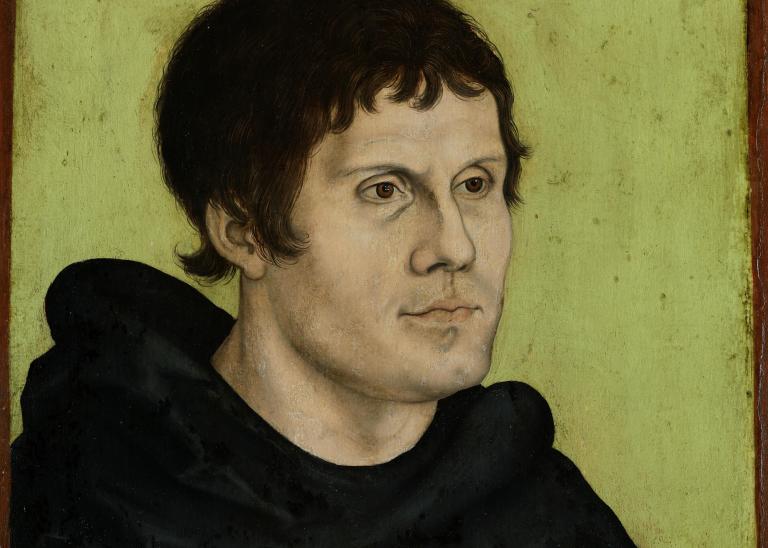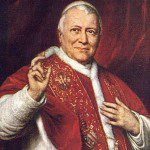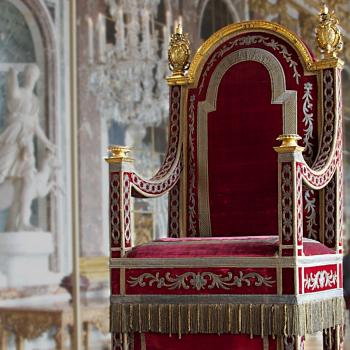
Martin Luther by Lucas Cranach the Elder
Let us do that thing that the blogging Catholic must sometimes do, which is to parse a difficult passage from one of the pope’s innumerable interviews. This, again, was his interview last June as he winged his way back to Rome from Armenia. A reporter said, “Hey! That Martin Luther guy. You can rehabilitate him, right? Perhaps lift his excommunication? What say you?” It was an insane question. Martin Luther’s excommunication ended in 1546 when he died.
Now, I have been told, since my last post: “Well, you know, the pope, he only meant to say Luther was not altogether wrong. Luther was right at first. Especially he was right that justification begins with God’s initiative alone.”
So I go through the pope’s words to see. (And here I mean the pope’s words up in the clouds, somewhere between Armenia and Rome.)
I think that the intentions of Martin Luther were not mistaken. He was a reformer. Perhaps some methods were not correct. But in that time, if we read the story of the Pastor, a German Lutheran who then converted when he saw reality – he became Catholic – in that time, the Church was not exactly a model to imitate. There was corruption in the Church, there was worldliness, attachment to money, to power…and this he protested.
Okay, fair enough. Yes, there’s always corruption somewhere. Men are not angels. I imagine the pope is thinking of things like Luther being troubled by the abuse of indulgences. Indulgences themselves were not wrong, but in the fulness of time indulgences came to be attached to the giving of alms. That’s a good practice. But the rich, having more money to give alms than the poor, were able to obtain more indulgences. There was an inequity in that. Though not the intention, the effect was that the rich could “buy their way into heaven,” as it were. And the Church reformed this practice during the Counter Reformation.
But if this is where Pope Francis is thinking, “Martin Luther was initially right and concerned with the good,” it has nothing to do with the doctrine of justification.
We read on.
Then he was intelligent and took some steps forward justifying, and because he did this. [I have no clue. This is incoherent to me.] And today Lutherans and Catholics, Protestants, all of us agree on the doctrine of justification.
No we don’t. There are no longer any divisions to speak of regarding justification, among Catholics and “Protestants”? Your Holiness: Do you realize how many sects of Protestants there are? One can’t find agreement among Protestants on justification, let alone between Protestants in the aggregate and Catholics.
Now, note: The pope does not qualify these words in the least. He does not say “Catholics and Protestants can find some common ground on justification.” To be sure, we do. But “all of us agree”? The pope does not say, “There is common ground to build on.” He says, “all of us agree.” I don’t think so.
We read on.
On this point [i.e., justification], which is very important, he did not err. [Yes he did.] He made a medicine for the Church, but then this medicine consolidated into a state of things, into a state of a discipline, into a way of believing, into a way of doing, into a liturgical way and he wasn’t alone; there was Zwingli, there was Calvin, each one of them different, and behind them were who?
Again, the pope qualifies nothing when he says that Luther “did not err.” Absolute statement. He does not say, “Luther got some things right”; he says, “Luther did not err.” Well, no: The Council of Trent and Leo X in Exsurge Domine say he did.
And I’m not really sure what the pope is tring to say when he veers back into that long discussion about a “medicine for the church” that “consolidated into a state of things,” “a way of believing,” a “liturgical way.” I mean: Say what? Frankly, I think the pope is free associating, but I can’t discern any meaning.
We read on.
Principals! We must put ourselves in the story of that time. It’s a story that’s not easy to understand, not easy. [The pope’s “not easy to understand” just now.] Then things went forward, and today the dialogue is very good. That document of justification I think is one of the richest ecumenical documents in the world, one in most agreement. But there are divisions, and these also depend on the Churches.
So the pope acknowledges “divisions,” but he seems to have in mind (when we read what is next) ecclesial divisions in Christian communion, not divisions in doctrine.
In Buenos Aires there were two Lutheran churches, and one thought in one way and the other…even in the same Lutheran church there was no unity; but they respected each other, they loved each other, and the difference is perhaps what hurt all of us so badly and today we seek to take up the path of encountering each other after 500 years.
So the pope has shifted ideas again, and is now speaking in very general terms about the problem of Christian division. Again, this is ecclesial division, not doctrinal division, so one can not point to these words and claim that the pope does concede disagreement on justification.
The pope ends with a general injunction that we all pray for one another. That’s a good idea, but it doesn’t take away his two errors: (1) That Catholics and Protestants agree on justification; (2) That Martin Luther was “not in error.”
***
The pope spoke about Luther again on October 31. Here’s the key paragraph:
The spiritual experience of Martin Luther challenges us to remember that apart from God we can do nothing. “How can I get a propitious God?” This is the question that haunted Luther. In effect, the question of a just relationship with God is the decisive question for our lives. As we know, Luther encountered that propitious God in the Good News of Jesus, incarnate, dead and risen. With the concept “by grace alone”, he reminds us that God always takes the initiative, prior to any human response, even as he seeks to awaken that response. The doctrine of justification thus expresses the essence of human existence before God.
Fortunately there are no errors in what the pope says here. But I must point out that the problem with Luther is not “by grace alone” but “through faith alone.” That was the problem. “By grace alone” is not all that Luther said, and if you miss the rest then you miss what made Luther Luther, and a key (false) doctrine that drove the Reformation 500 years ago.
It is true that “God always takes the initiative, prior to any human response,” but why do I need Martin Luther to remind me of this? The Arminians call it “prevenient grace” (I was raised United Methodist and still love that term), but the concept is also in the Bible.
- John 6:44: “No man can come to me, except the Father which hath sent me draw him: and I will raise him up at the last day.
- 1 John 4:19: “We love him, because he first loved us.
It is taught by the Council of Trent. (Not because Trent was conceding anything to Luther, but because it was affirming what the Church had always taught.)
It is furthermore declared that in adults the beginning of that justification must proceed from the predisposing grace of God through Jesus Christ, that is, from His vocation, whereby, without any merits on their part, they are called; that they who by sin had been cut off from God, may be disposed through His quickening and helping grace to convert themselves to their own justification [But now watch what follows.] by freely assenting to and cooperating with that grace; so that, while God touches the heart of man through the illumination of the Holy Ghost, man himself neither does absolutely nothing while receiving that inspiration, since he can also reject it, nor yet is he able by his own free will and without the grace of God to move himself to justice in His sight.
The key thing about Luther is not that he affirmed the first but that he denied the second. Luther taught the bondage of the will, even after initial justification. He taught that it was by faith alone, even after prevenient grace.
Moreover, prevenient grace is taught by Aquinas and by Augustine. So I don’t need Luther to remind me of what I can read in Trent and Augustine and Aquinas. Luther was Luther not because of where he agreed with Catholicism but because of where he disagreed.
I do sympathize with the pope’s desire for Christian unity—I have that same desire. But unity can not come at the expense of truth or of covering over real differences between Catholics and Protestants. While there is much common ground, and while our view of Luther personally should rightly be charitable and forgiving, we can not deny his errors, which Protestants today still accept.
















